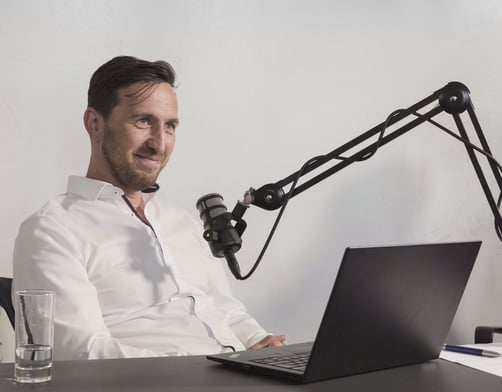
PGS is a global leader in subsurface seismic imaging, which is used to help find oil and gas reserves offshore. The company’s SVP of Technology and Digitalization, Erik Ewig, says the images they provide to clients are essential in order to drill the first wells. That makes time of the essence, which is why PGS embraces digital transformation to speed things up. Listen to the full episode below or read on for the highlights.
PGS gives their clients a look inside the Earth. Literally. These clients are the oil operators who need insight into where they should drill. They may hold a license to explore, but their drilling must be deliberate. These operators rely on PGS to give them the necessary information to make informed decisions on where the hydrocarbons may be found.
“We are essentially providing our clients with an ultrasound of the Earth. This is high resolution, 3D, seismic data in enormous quantities,” explains Ewig.
To date, this data has simply been too enormous to transfer. This meant that the data was recorded on to physical tapes, transported via DHL to the client, and then uploaded to the client’s system before it could be analyzed. According to Ewig, pictured below, this meant that the time from data recording to image delivery, which supported client decision-making, could take months or more.
Improving their turnaround time from image capture to client benefit is key to what PGS does
“Getting our data to clients faster and easier is the key to providing better service,” adds Ewig. And PGS is doing just that. In the company’s collaboration with Cognite, for example, this data is being moved to the cloud, giving their clients a new and much more instantaneous way to interact with essential images and related data, in just seconds.
“Now the clients can directly stream (the seismic data) via open APIs to view it, or they can simply download it from the cloud platform,” explains Ewig.
PGS recognized that digital transformation would benefit their own operations, not just their clients
In addition to transforming to create customer value, PGS also realized that true transformation starts on the inside. They focused on building a strong company culture around their internal digitalization and set some immediate goals for themselves, with the aim to see clear business outcomes. They started with their vessels. Each vessel contains a significant amount of operational and maintenance data. But this data has historically been locked into silos.
PGS understood the inefficiency of this way of work and decided to bring all the data together. “Data liberation is key. All of our data records available on one joint platform, and get insights from here,” says Ewig.
Another challenge PGS faced was the speed of their vessels
Their vessels are not exactly just any old ship at sea. Ewig describes them as perhaps the “biggest human moveable object on the planet” with 16 eight-kilometer long streamers in tow. This complex operation creates a lot of limiting factors when it comes to just how fast this vessel can move.
“We wanted to look into those limiting factors (for speed) at the same time, and at any point be able to define the optimum speed for the vessel,” says Ewig. Doing this required a dashboard, which brought all the data into one place for PGS. The result so far?
“We’ve seen an increase on average in vessel speed during our surveys,” he says.
Predictive maintenance can prevent costly operational shut-downs
In addition to speed optimization, Ewig says that predictive maintenance has also been an area of focus for PGS. Replacing even just one of the 16 streamers (filled with recording sensors) takes significant time and could potentially stop up the operations due to a streamer failure. To prevent this, PGS is building the capabilities to know when to repair or even replace the streamer before it fails, saving precious time and ensuring smooth operations.
Ewig urges more data sharing across the industry, where it makes sense
“We are still at a very early stage. There are so many possibilities for use case where digitalization could play a role,” he says. Ewig says they are at a good starting point, but he urges more openness, sharing and volunteering across the oil and gas industry.
“We as an industry talk a lot about openness…but we also need to identify where we want to collaborate and areas where we want to compete. That needs to be clear…when we establish that, we can come together.”
Faster data delivery to clients. More efficient vessels. Predictive maintenance for their streamers. These advances are just the beginning for PGS. Ewig says, they are still in their infancy, even if a very rapidly advancing infancy. The company faces huge cost pressure as a key player in a changing industry, which is why they’ve embraced a broad approach to transforming, from the inside-out.
Listen to Cognite Convos on Spotify or Apple Podcast.